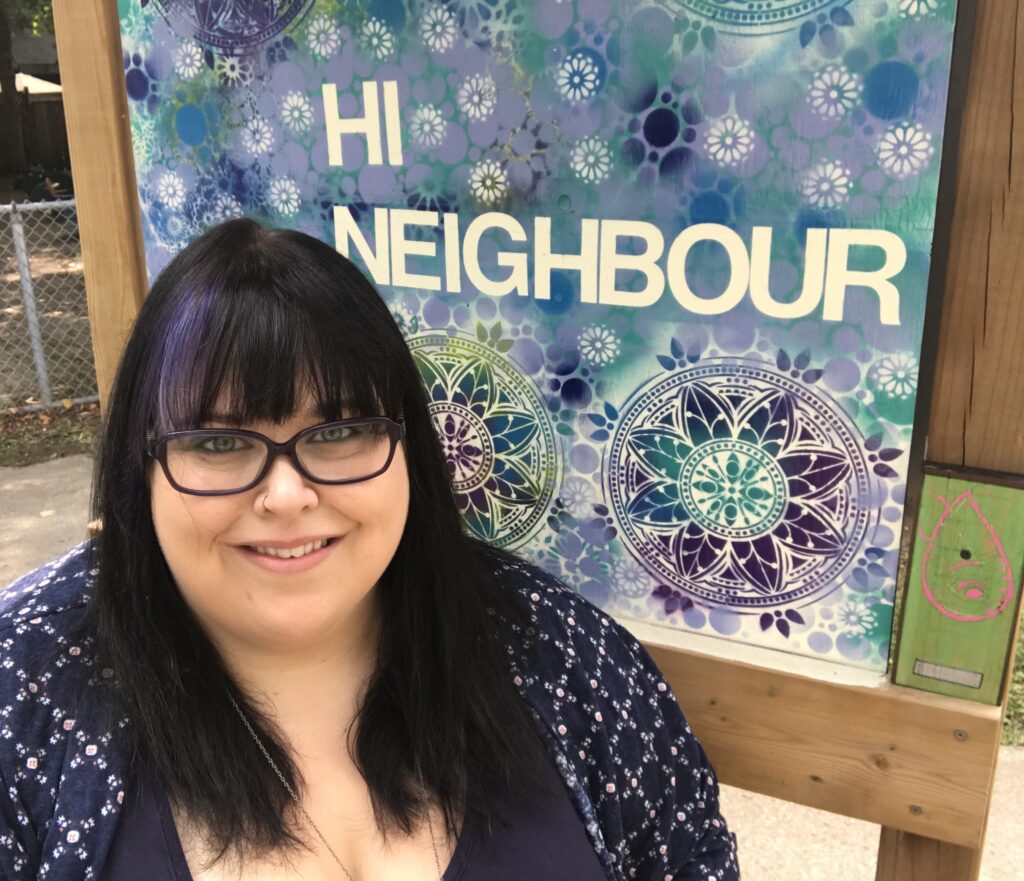Network of Neighbours was born out of the early days of the COVID 19 pandemic. Like dominos, places that served as natural intervention points for gender-based violence (GBV) – grocery stores, salons, coffee shops, social service and government agencies, and public gathering spaces– reduced their hours or were shut down completely. Just as these natural intervention points were being challenged, stay at home orders also came into effect, essentially making many of us hyper reliant on those in our households and our immediate neighbourhood for many things, including care. This situation brought the opportunity to build a network of neighbours in Waterloo Region who could act as points of natural intervention because they would have the skills and knowledge they need to push past their own fears and feel confident helping in situations of GBV.
Network of Neighbours teaches everyday caring neighbours ways in which to support someone experiencing GBV. The training supports participants as they learn about the nature of GBV and how to recognize it, how it behaves, escalates and cycles, interventions that are useful in different situations, and provides the opportunity to put knowledge into action through realistic case scenarios. The most unique aspect of this training is that it is built completely from a harm reduction approach, allowing participants to explore how they can help to reduce the harm caused by GBV in any situation, and with anyone who is experiencing any type and intensity of GBV. This approach also challenges the traditional hyperfocus on someone ‘leaving’ the violent situation as being the marker of success in an intervention. Instead, understanding that situations of GBV are nuanced and that leaving those situations is highly contextualized and an individuals’ choice of how, when, or even if. This creates a shift to accept that GBV might continue to happen for the person they care about and to reframe their focus on how to reduce the power and harm of violence for that person.
For most, this wasn’t an easy reality to sit with but it is a key way to prevent further harm that can happen from intervening. Among our participants the thought that they could ‘make things worse’ by intervening was a huge barrier to getting involved and a core source of guilt. A harm reduction approach pushes you to think critically about your actions as a helper to ensure your help continues to reduce harm throughout the helping journey. This approach also challenged participants to move beyond default interventions such as calling police, especially anonymously, as we know that often if charges are not laid it can extend the harm and lead to situations of escalated violence.
As individuals, what motivates us to participate in community interventions like this is often something personal, it’s a missed opportunity, a regret, a deep unknown, or even a genuine concern for someone and desire to see a better world for them. Monumental change in a community first comes from nurturing those ready to be part of the change, the rest can follow. My biggest personal lesson learned through Network of Neighbours is the absolute changemaking power that comes from those who have already ‘bought in’ and just need some nurturing and direction around what to do with their desire to create stronger and safer communities for women (she, they, us).
Community interventions rarely get the privilege of existing long enough in time but my belief is that those who resonated with Network of Neighbours will continue its legacy in small moments and large and that women in Waterloo Region are safer for it.
Bio: Jennifer is an award-winning macro social worker who has received recognition for her work in community building, advocacy, research, and program design. She’s been with the YWCA movement for over 10 years, working at YWCA Cambridge, YW Kitchener-Waterloo and with YWCA Ontario as a consultant with her business Pineapple Flags that helps non-profits build assets and work past barriers to achieving the change they wish to see in their communities. Jennifer has a Masters in Social Work from Wilfrid Laurier University and has been working in GBV for the past 15 years. She’s held roles in prevention work with youth, front line support, research, and now pushes for policy change on a local, provincial and national stage.
